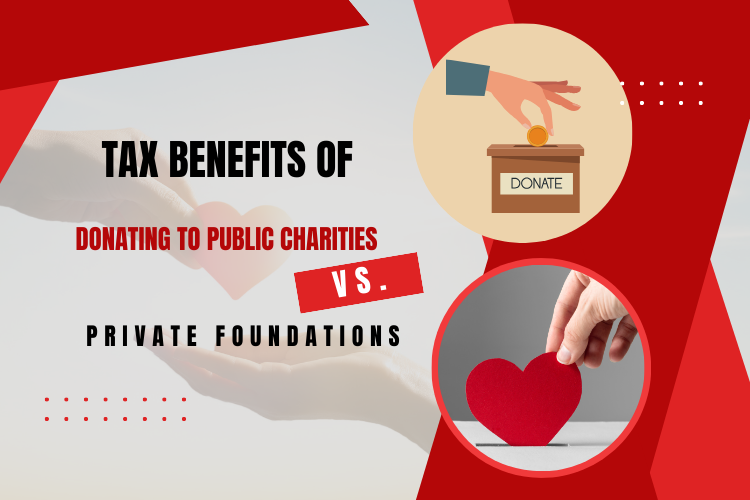
Maximizing Your Charitable Impact: Understanding the Tax Benefits of Donating to Public Charities vs. Private Foundations
When people donate to charity, they often do so with the thought that they might get tax benefits. Understanding the distinctions in tax benefits when donating to public charities versus private foundations can assist in making well-informed decisions that are in line with your financial and charitable goals.
This article will explore the key distinctions and how they influence your philanthropic contributions.
Public Charities: A Path to Greater Tax Deductions

Public charities are the go-to for many donors, and for good reason. They offer several tax advantages that can make giving more appealing.
1. Generous AGI Deduction Limits

The IRS is more generous with public charities, allowing donors to deduct cash contributions up to 60% of their adjusted gross income (AGI). You can deduct up to 30% of your adjusted gross income (AGI) for non-cash donations such as stocks or real estate.
This increased limit can be especially advantageous for individuals making significant contributions.
2. Deducting Fair Market Value

You can deduct their fair market value when donating appreciated assets for over a year. In this case, you can write off the asset’s value instead of the amount you paid.
This would help you avoid capital gains taxes and get a more significant deduction.
3. No Excise Tax on Investment Income:

Public charities are exempt from the excise tax on net investment income. This can be a solid reason to support them because it means they can use more of their money for their good causes.
Private Foundations: Considerations for Specialized Giving

Private foundations offer a more controlled approach to philanthropy, but with different tax considerations.
1. Lower AGI Deduction Limits

Donating cash to private foundations can deduct up to 30% of your AGI. For non-cash assets, the limit is 20%. These lower limits may affect your tax planning if you consider large donations.
2. Cost Basis Deduction for Non-Cash Donations

Donating non-cash assets to a private foundation typically allows you to deduct the cost basis rather than the current market value, unlike with public charities.
Pass-through foundations that distribute donated assets promptly are an exception to this rule.
3. Excise Tax on Investment Income

Private foundations pay an excise tax on their net investment income. Although this does not directly impact your tax deduction, it may influence your decision if you aim to optimize the financial effectiveness of your charitable giving.
Making the Right Choice for Your Philanthropic Journey

While the tax benefits are more favorable for donations to public charities, private foundations offer unique advantages, such as greater control over how your funds are used and the ability to create a lasting family legacy.
Consider both tax strategy and personal values when making your decision.
A Word to the Wise: Consult the Experts

Tax laws are complex and subject to change. Before making any significant charitable contributions, it’s wise to consult with a tax professional or financial advisor.
They can provide personalized advice based on the latest regulations and your specific financial situation.
Conclusion
Whether you support a public charity or a private foundation, your contributions are valuable to the causes you care about.
Understanding the tax consequences of each choice allows you to make strategic decisions that are advantageous for both yourself and the organizations you select.
Remember, the most crucial aspect of giving is the difference you make in the lives of others.
